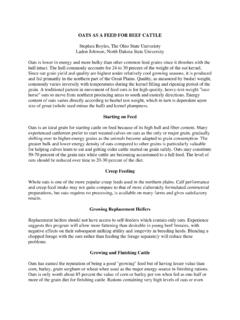Transcription of The
1 TheTyrannyofLogic suggests that havingoptions allows people to select precisely whatmakes them happiest. But as, studies show,abundant choice oftenmakes for misery By Barry Schwartzmericans today choose among moreoptions in more parts of life than hasever been possible before. To an extent, the opportunity to chooseenhances our lives. It is only logical to think that if some choice isgood, more is better; people who care about having infinite optionswill benefit from them, and those who do not can always just ig-nore the 273 versions of cereal they have never tried. Yet recent re-search strongly suggests that, psychologically, this assumption iswrong. Although some choice is undoubtedly better than none,more is not always better than evidence is consistent with large-scale social of well-being by various social scientists amongthem, David G. Myers ofHope College and Robert of Yale University re-veal that increased choice andincreased affluence have, infact, been accompanied bydecreased well-being in and most other affluent societies.
2 As the gross domestic prod-uct more than doubled in the past 30 years, the proportion of thepopulation describing itself as very happy declined by about 5percent, or by some 14 million people. In addition, more of us thanever are clinically depressed. Of course, no one believes that a sin-gle factor explains decreased well-being, but a number of findingsindicate that the explosion of choice plays an important , it seems that as society grows wealthier and people be-come freer to do whatever they want, they get less happy. In an eraof ever greater personal autonomy, choice and control, what couldaccount for this degree of misery?Along with several colleagues, I have recently conducted re-search that offers insight into why many people end up unhappyrather than pleased when their options expand. We began by mak-ing a distinction between maximizers (those who always aim tomake the best possible choice) and satisficers (those who aim for good enough, whether or not better selections might be outthere).
3 We borrowed the term satisficers from the late NobelPrize winning psychologist and economist Herbert A. Simon ofCarnegie Mellon University. In particular, we composed a set of statements the Maxi-mization Scale to diagnose people s propensity tomaximize. Then we had several thousand people ratethemselves from 1 to 7 (from completely disagree AChoiceto completely agree ) on such statements as I never settlefor second best. We also evaluated their sense of satisfactionwith their did not define a sharp cutoff to separate maximizers fromsatisficers, but in general, we think of individuals whose averagescores are higher than 4 (the scale s midpoint) as maximizers andthose whose scores are lower than the midpoint as who score highest on the test the greatest maximizers engage in more product comparisons than the lowest scorers,both before and after they make purchasing decisions, and theytake longer to decide what to buy. When satisficers find an itemthat meets their standards, they stop looking.
4 But maximizersexert enormous effort reading labels, checking out consumermagazines and trying new products. They also spend more timecomparing their purchasing decisions with those of , no one can check out every option, but maxi-mizers strive toward that goal, and so making a decision be-comes increasingly daunting as the number of choices , after making a selection, they are nagged by the alter-natives they have not had time to investigate. In the end, they aremore likely to make better objective choices than satisficers butget less satisfaction from them. When reality requires maximiz-ers to compromise to end a search and decide on something apprehension about what might have been takes found as well that the greatest maximizers are the leasthappy with the fruits of their efforts. When they compare them-selves with others, they get little pleasure from finding out thatthey did better and substantial dissatisfaction from finding outthat they did worse.
5 They are more prone to experiencing regretafter a purchase, and if their acquisition disappoints them, theirsense of well-being takes longer to recover. They also tend tobrood or ruminate more than satisficers it follow that maximizers are less happy in general thansatisficers? We tested this by having people fill out a variety ofquestionnaires known to be reliable indicators of well-being. Asmight be expected, individuals with high maximization scoresexperienced less satisfaction with life and were less happy, lessoptimistic and more depressed than people with low maximiza-tion scores. Indeed, those with extreme maximization ratings haddepression scores that placed them in the borderline clinical for UnhappinessSEVERAL FACTORS EXPLAINwhy more choice is not al-ways better than less, especially for maximizers. High amongthese are opportunity costs. The quality of any given optioncannot be assessed in isolation from its alternatives.
6 One of the costs of making a selection is losing the opportunities that adifferent option would have afforded. Thus, an opportunitycost of vacationing on the beach in Cape Cod might be missingthe fabulous restaurants in the Napa Valley. If we assume thatopportunity costs reduce the overall desirability of the most pre-ferred choice, then the more alternatives there are, the deeperour sense of loss will be and the less satisfaction we will derivefrom our ultimate Brenner of the University of Florida and his collabora-MATT COLLINS (preceding pages and above); ADAPTED BY PERMISSION FROM THE JOURNAL OF PERSONALITY AND SOCIAL PSYCHOLOGY, 2002 BY THE AMERICAN PSYCHOLOGICAL ASSOCIATION (this page)THE MAXIMIZATION SCALETHE STATEMENTS BELOW distinguish maximizers fromsatisficers. Subjects rate themselves from 1 to 7, from completely disagree to completely agree, on eachstatement. We generally consider people whose averagerating is higher than 4 to be maximizers.
7 When we looked ataverages from thousands of subjects, we found that about a third scored higher than and a third lower than 10 percent of subjects were extreme maximizers(averaging greater than ), and 10 percent were extremesatisficers (averaging lower than ) I m faced with a choice, I try to imagine whatall the other possibilities are, even ones that aren tpresent at the matter how satisfied I am with my job, it s only rightfor me to be on the lookout for better opportunities. When I am in the car listening to the radio, I often checkother stations to see if something better is playing, evenif I am relatively satisfied with what I m listening I watch TV, I channel surf, often scanning throughthe available options even while attempting to watchone treat relationships like clothing: I expect to try a loton before finding the perfect often find it difficult to shop for a gift for a videos is really difficult. I m always strugglingto pick the best one.
8 When shopping, I have a hard time finding clothing that I really m a big fan of lists that attempt to rank things (the best movies, the best singers, the best athletes,the best novels, etc.). I find that writing is very difficult, even if it s just writinga letter to a friend, because it s so hard to word thingsjust right. I often do several drafts of even simple matter what I do, I have the highest standards for never settle for second often fantasize about living in ways that are quitedifferent from my actual 2004tors demonstrated the effects of opportunity costs when theyhad subjects put a dollar value on subscriptions to magazines orflights from San Francisco to attractive locations. Some attachedprices to a single magazine subscription or a single attached prices to the same magazine or destinationwhen it was part of a group containing three others. Prices wereconsistently lower when a given alternative was evaluated aspart of a group than when it was evaluated in might this be so?
9 When you assign a value to, say,Newsweek, as part of a group that also contains People, theNew Republic and Us, your tendency will be to compare thevarious magazines. Perhaps you judge Newsweek to be moreinformative than People but less entertaining. Each compari-son that Newsweek wins will be a gain, but each comparisonthat it loses will be a loss, an opportunity cost. Any particularmagazine will both benefit and suffer from comparison withothers. But we know from the research of Nobelist psycholo-gist Daniel Kahneman of Princeton University and his late col-league Amos Tversky of Stanford that losses (in this case, op-portunity costs) have a much greater psychological impact thangains. Losses make us hurt more than gains make us feel opportunity costs may create enough conflict toproduce paralysis. For example, participants in one study wereoffered $ for filling out some questionnaires. After they fin-ished, they were offered a fancy metal pen instead of the $ told that the pen usually costs about $2.
10 Seventy-five per-cent chose the pen. In a second condition, subjects were offeredthe $ or a choice between that same metal pen and a pairof less expensive felt-tipped pens (also worth about $2 togeth-er). Now fewer than 50 percent chose any pen. The problem of opportunity costs will be worse for a max-imizer than for a satisficer. The latter s good enough philos-ophy can survive thoughts about opportunity costs. In addition,the good enough standard leads to much less searching andinspection of alternatives than the maximizer s best fewer choices under consideration, a person will have few-er opportunity costs to Adds to CostsJUST AS PEOPLE FEEL sorrow about the opportunities theyhave forgone, they may also suffer regret about the option theysettle on. My colleagues and I devised a scale to measure prone-ness to feeling regret, and we found that people with high sen-sitivity to regret are less happy, less satisfied with life, less op-timistic and more depressed than those with low surprisingly, we also found that people with high regretsensitivity tend to be maximizers.





